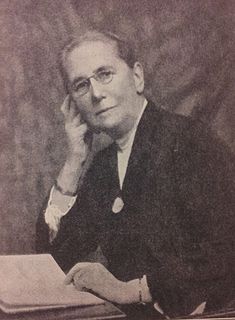A Quote by Emma Goldman
Christianity is most admirably adapted to the training of slaves, to the perpetuation of a slave society.
Related Quotes
Christianity is most admirably adapted to the training of slaves, to the perpetuation of a slave society; in short, to the very conditions confronting us today. The rulers of the earth have realized long ago what potent poison inheres in the Christian religion. That is the reason they foster it; that is why they leave nothing undone to instill it into the blood of the people. They know only too well that the subtleness of the Christian teachings is a more powerful protection against rebellion and discontent than the club or the gun.
All you have to do is go back to slavery - days, and there were two types of slaves, the house slave and the field slave. The house slave was the one who believed in the master, who had confidence in the master and usually was very friendly with the master. And usually he was also used by the master to try and keep the other slaves pacified.
Man is the only slave. And he is the only animal who enslaves. He has always been a slave in one form or another, and has always held other slaves in bondage under him in one way or another. In our day, he is always some man's slave for wages, and does that man's work; and this slave has other slaves under him for minor wages, and they do his work. The higher animals are the only ones who exclusively do their own work and provide their own living.
The other slaves in the field never let that house slave knew - know what they were really thinking. If the house slave said, well one of these days all of us will live in the plantation, they said, uh huh. They went along with him. But if you came up to them and said, let's go, they would be gone just like that.And in, in America you have the same situation.You have the vast masses who are still slaves.
It was not Christianity which freed the slave: Christianity accepted slavery; Christian ministers defended it; Christian merchants trafficked in human flesh and blood, and drew their profits from the unspeakable horrors of the middle passage. Christian slaveholders treated their slaves as they did the cattle in their fields: they worked them, scourged them, mated them , parted them, and sold them at will. Abolition came with the decline in religious belief, and largely through the efforts of those who were denounced as heretics.
There is nothing grand or noble in having the use of a slave, in so far as he is a slave; or in issuing commands about necessary things. But it is an error to suppose that every sort of rule is despotic like that of a master over slaves, for there is as great a difference between the rule over freemen and the rule over slaves as there is between slavery by nature and freedom by nature . .
The use of slave women as day workers naturally broke up or made impossible the normal Negro home, and this and the slave code led to a development of which the South was really ashamed and which it often denied, and yet perfectly evident: the raising of slaves in the Border slave states for systematic sale on the commercialized cotton plantations.
Is individual gender suffering relieved at the price of role conformity and the perpetuation of role stereotypes on a social level? In changing sex, does the transsexual encourage a sexist society whose continued existence depends upon the perpetuation of these roles and stereotypes? These and similar questions are seldom raised in transsexual therapy at present.

































